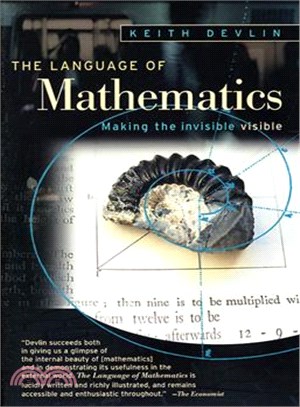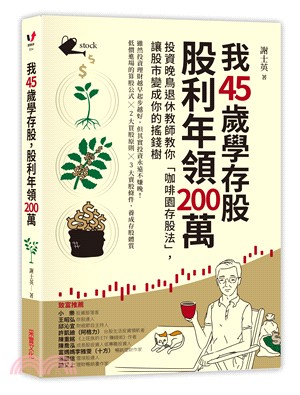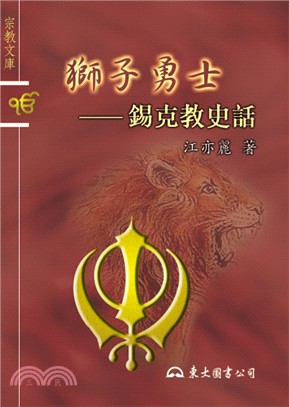The Language of Mathematics ─ Making the Invisible Visible
商品資訊
相關商品
商品簡介
作者簡介
商品簡介
"The great book of nature," said Galileo, "can be read only by those who know the language in which it was written. And this language is mathematics." In The Language of Mathematics, award-winning author Keith Devlin reveals the vital role mathematics plays in our eternal quest to understand who we are and the world we live in. More than just the study of numbers, mathematics provides us with the eyes to recognize and describe the hidden patterns of life—patterns that exist in the physical, biological, and social worlds without, and the realm of ideas and thoughts within.
Taking the reader on a wondrous journey through the invisible universe that surrounds us—a universe made visible by mathematics—Devlin shows us what keeps a jumbo jet in the air, explains how we can see and hear a football game on TV, allows us to predict the weather, the behavior of the stock market, and the outcome of elections. Microwave ovens, telephone cables, children's toys, pacemakers, automobiles, and computers—all operate on mathematical principles. Far from a dry and esoteric subject, mathematics is a rich and living part of our culture. An exploration of an often woefully misunderstood subject, The Language of Mathematics celebrates the simplicity, the precision, the purity, and the elegance of mathematics. Keith Devlin is Dean of the School of Science at Saint Mary's College of California and Senior Researcher at Stanford University's Center for the Study of Language and Information. A key participant in the six-part PBS television series "Life by the Numbers," he is the author of Life by the Numbers, Goodbye, Descartes, Logic and Information, and Mathematics: The New Golden Age. His most recent book is InfoSense: Turning Information into Knowledge."The great book of nature," said Galileo, "can be read only by those who know the language in which it was written. And this language is mathematics." In The Language of Mathematics, award-winning author Keith Devlin reveals the vital role mathematics plays in our eternal quest to understand who we are and the world we live in. More than just the study of numbers, mathematics provides us with the eyes to recognize and describe the hidden patterns of life—patterns that exist in the physical, biological, and social worlds without, and the realm of ideas and thoughts within.
Taking the reader on a wondrous journey through the invisible universe that surrounds us—a universe made visible by mathematics—Devlin shows us what keeps a jumbo jet in the air, explains how we can see and hear a football game on TV, allows us to predict the weather, the behavior of the stock market, and the outcome of elections. Microwave ovens, telephone cables, children's toys, pacemakers, automobiles, and computers—all operate on mathematical principles. Far from a dry and esoteric subject, mathematics is a rich and living part of our culture. An exploration of an often woefully misunderstood subject, The Language of Mathematics celebrates the simplicity, the precision, the purity, and the elegance of mathematics. "Devlin succeeds both in giving us a glimpse of the internal beauty of the subject and in demonstrating its usefulness in the external world. The Language of Mathematics is lucidly written and richly illustrated, and remains accessible and enthusiastic throughout."—The Economist
"Keith Devlin's The Language of Mathematics is the perfect book for people who have questions about math they've always wanted to ask but were afraid they wouldn't understand the answers to."—Boston Book Review
"Devlin takes readers on a tour of the numeric underpinnings of everyday life."—Wired
"As Galileo put it, ‘The great book of nature can be read only by those who know the language in which it was written. And this language is mathematics.' Keith Devlin is an apt teacher of the language."—Scientific American
"Devlin, who is able to write for generalists, embarks on the sea of numbers, shapes, and patterns. His voyage potentially had sixty or so destinations, the discrete topics that make up mathematics; to manage the trip Devlin limits the port of call to eight . . . Devlin's tour indeed achieves its purpose."—Booklist
"Those interested in a broad take on the history and current state of the art of math should look no further than The Language of Mathematics."—Publishers Weekly The Language of Mathematics
Making the Invisible Visible
Keith Devlin (St. Mary's College)
Chance
Every year, thirty million people flock to a small town in the middle of the Nevada desert. The purpose of their trip—and the only reason why the town of Las Vegas is anything other than a small, sleepy, dusty hamlet—is gambling. In present-day America, gambling is a $40 billion business, and it is growing faster than almost any other industry. By knowing about the patterns of chance, casinos ensure that they make an average of 3 cents on every dollar. As a result, they enjoy annual profits of $16 billion.
Contemplating today's glitzy—and sometimes seedy—world of casinos, it is easy to forget that the entire gambling industry rests upon a series of letters exchanged by two French mathematicians in the middle of the seventeenth century.
Equally dependent on that seventeenth century mathematics is gambling's more respectable cousin, the insurance industry. (Actually, insurance was not always viewed as respectable. Until well into the eighteenth century, the issuance of life insurance was illegal in all European countries except England.)
In mathematical terms, what those two Frenchmen did was found the present day subject of probability theory—the branch of mathematics that studies the patterns of chance.
Who Goes to Heaven?
People have always been fascinated by chance. For instance, according to ancient Greek mythology, the world began when the three brothers Zeus, Poseidon, and Hades rolled dice for the universe. On that occasion, so the story goes, Zeus won the first prize, the heavens, Poseidon took second prize, the seas, and Hades had to settle for hell.
Early dice generally consisted of the small, squarish knuckle-bone, called an astralagus, taken from the ankles of sheep or deer. Paintings of dice games using astralagi have been found on the walls of Egyptian tombs and on Greek vases, and polished astralagi have been found in archaeological excavations in many parts of the ancient world.
up0
But for all the fascination with dice and other games of chance, it was not until the seventeenth century that anyone worked out the mathematics of games of chance. Perhaps surprisingly, the Greeks did not even try to develop such a theory. Given their high regard for mathematical knowledge, this was almost certainly because they did not believe there was any order to be found in chance events. For the Greeks, chance was the complete absence of order. Aristotle wrote "It is evidently equally foolish to accept probable reasoning from a mathematician and to demand from a rhetorician demonstrative proofs."
In some sense, the Greeks were right: There is no order in a purely chance event. To find order in chance—to discover a mathematical pattern--you have to see what happens when the same kind of chance event is repeated many times.
Figuring the Odds
The first step toward a theory of chance came when a sixteenth century Italian physician̵
Taking the reader on a wondrous journey through the invisible universe that surrounds us—a universe made visible by mathematics—Devlin shows us what keeps a jumbo jet in the air, explains how we can see and hear a football game on TV, allows us to predict the weather, the behavior of the stock market, and the outcome of elections. Microwave ovens, telephone cables, children's toys, pacemakers, automobiles, and computers—all operate on mathematical principles. Far from a dry and esoteric subject, mathematics is a rich and living part of our culture. An exploration of an often woefully misunderstood subject, The Language of Mathematics celebrates the simplicity, the precision, the purity, and the elegance of mathematics. Keith Devlin is Dean of the School of Science at Saint Mary's College of California and Senior Researcher at Stanford University's Center for the Study of Language and Information. A key participant in the six-part PBS television series "Life by the Numbers," he is the author of Life by the Numbers, Goodbye, Descartes, Logic and Information, and Mathematics: The New Golden Age. His most recent book is InfoSense: Turning Information into Knowledge."The great book of nature," said Galileo, "can be read only by those who know the language in which it was written. And this language is mathematics." In The Language of Mathematics, award-winning author Keith Devlin reveals the vital role mathematics plays in our eternal quest to understand who we are and the world we live in. More than just the study of numbers, mathematics provides us with the eyes to recognize and describe the hidden patterns of life—patterns that exist in the physical, biological, and social worlds without, and the realm of ideas and thoughts within.
Taking the reader on a wondrous journey through the invisible universe that surrounds us—a universe made visible by mathematics—Devlin shows us what keeps a jumbo jet in the air, explains how we can see and hear a football game on TV, allows us to predict the weather, the behavior of the stock market, and the outcome of elections. Microwave ovens, telephone cables, children's toys, pacemakers, automobiles, and computers—all operate on mathematical principles. Far from a dry and esoteric subject, mathematics is a rich and living part of our culture. An exploration of an often woefully misunderstood subject, The Language of Mathematics celebrates the simplicity, the precision, the purity, and the elegance of mathematics. "Devlin succeeds both in giving us a glimpse of the internal beauty of the subject and in demonstrating its usefulness in the external world. The Language of Mathematics is lucidly written and richly illustrated, and remains accessible and enthusiastic throughout."—The Economist
"Keith Devlin's The Language of Mathematics is the perfect book for people who have questions about math they've always wanted to ask but were afraid they wouldn't understand the answers to."—Boston Book Review
"Devlin takes readers on a tour of the numeric underpinnings of everyday life."—Wired
"As Galileo put it, ‘The great book of nature can be read only by those who know the language in which it was written. And this language is mathematics.' Keith Devlin is an apt teacher of the language."—Scientific American
"Devlin, who is able to write for generalists, embarks on the sea of numbers, shapes, and patterns. His voyage potentially had sixty or so destinations, the discrete topics that make up mathematics; to manage the trip Devlin limits the port of call to eight . . . Devlin's tour indeed achieves its purpose."—Booklist
"Those interested in a broad take on the history and current state of the art of math should look no further than The Language of Mathematics."—Publishers Weekly The Language of Mathematics
Making the Invisible Visible
Keith Devlin (St. Mary's College)
Chance
Every year, thirty million people flock to a small town in the middle of the Nevada desert. The purpose of their trip—and the only reason why the town of Las Vegas is anything other than a small, sleepy, dusty hamlet—is gambling. In present-day America, gambling is a $40 billion business, and it is growing faster than almost any other industry. By knowing about the patterns of chance, casinos ensure that they make an average of 3 cents on every dollar. As a result, they enjoy annual profits of $16 billion.
Contemplating today's glitzy—and sometimes seedy—world of casinos, it is easy to forget that the entire gambling industry rests upon a series of letters exchanged by two French mathematicians in the middle of the seventeenth century.
Equally dependent on that seventeenth century mathematics is gambling's more respectable cousin, the insurance industry. (Actually, insurance was not always viewed as respectable. Until well into the eighteenth century, the issuance of life insurance was illegal in all European countries except England.)
In mathematical terms, what those two Frenchmen did was found the present day subject of probability theory—the branch of mathematics that studies the patterns of chance.
Who Goes to Heaven?
People have always been fascinated by chance. For instance, according to ancient Greek mythology, the world began when the three brothers Zeus, Poseidon, and Hades rolled dice for the universe. On that occasion, so the story goes, Zeus won the first prize, the heavens, Poseidon took second prize, the seas, and Hades had to settle for hell.
Early dice generally consisted of the small, squarish knuckle-bone, called an astralagus, taken from the ankles of sheep or deer. Paintings of dice games using astralagi have been found on the walls of Egyptian tombs and on Greek vases, and polished astralagi have been found in archaeological excavations in many parts of the ancient world.
up0
But for all the fascination with dice and other games of chance, it was not until the seventeenth century that anyone worked out the mathematics of games of chance. Perhaps surprisingly, the Greeks did not even try to develop such a theory. Given their high regard for mathematical knowledge, this was almost certainly because they did not believe there was any order to be found in chance events. For the Greeks, chance was the complete absence of order. Aristotle wrote "It is evidently equally foolish to accept probable reasoning from a mathematician and to demand from a rhetorician demonstrative proofs."
In some sense, the Greeks were right: There is no order in a purely chance event. To find order in chance—to discover a mathematical pattern--you have to see what happens when the same kind of chance event is repeated many times.
Figuring the Odds
The first step toward a theory of chance came when a sixteenth century Italian physician̵
作者簡介
Keith Devlin is Dean of the School of Science at Saint Mary's College of California and Senior Researcher at Stanford University's center for the Study of Language and Information. A key participant in the six-part PBS television series "Life by the Numbers," he is the author of Life by Numbers; Goodbye, Descartes; Logic and Information; Mathematics: The New Golden Age; and InfoSense: Turning Information into Knowledge.
主題書展
更多
主題書展
更多書展本週66折
您曾經瀏覽過的商品
購物須知
外文書商品之書封,為出版社提供之樣本。實際出貨商品,以出版社所提供之現有版本為主。部份書籍,因出版社供應狀況特殊,匯率將依實際狀況做調整。
無庫存之商品,在您完成訂單程序之後,將以空運的方式為你下單調貨。為了縮短等待的時間,建議您將外文書與其他商品分開下單,以獲得最快的取貨速度,平均調貨時間為1~2個月。
為了保護您的權益,「三民網路書店」提供會員七日商品鑑賞期(收到商品為起始日)。
若要辦理退貨,請在商品鑑賞期內寄回,且商品必須是全新狀態與完整包裝(商品、附件、發票、隨貨贈品等)否則恕不接受退貨。























